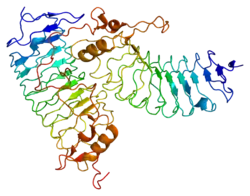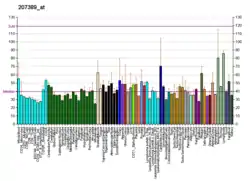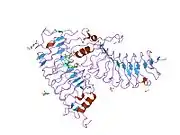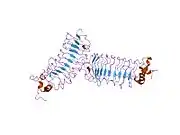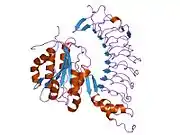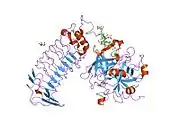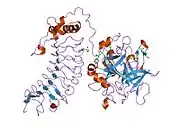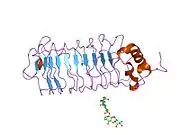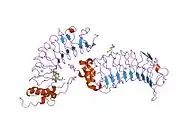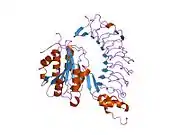GP1BA
Platelet glycoprotein Ib alpha chain also known as glycoprotein Ib (platelet), alpha polypeptide or CD42b (Cluster of Differentiation 42b), is a protein that in humans is encoded by the GP1BA gene.
Function
Glycoprotein Ib (GP Ib) is a platelet surface membrane glycoprotein composed of a heterodimer, an alpha chain and a beta chain, that are linked by disulfide bonds. The Gp Ib functions as a receptor for von Willebrand factor (VWF). The complete receptor complex includes noncovalent association of the alpha and beta subunits with platelet glycoprotein IX and platelet glycoprotein V. The binding of the GP Ib-IX-V complex to VWF facilitates initial platelet adhesion to vascular subendothelium after vascular injury, and also initiates signaling events within the platelet that lead to enhanced platelet activation, thrombosis, and hemostasis. This gene encodes the alpha subunit. Several polymorphisms and mutations have been described in this gene, some of which are the cause of Bernard–Soulier syndromes and platelet-type von Willebrand disease.[5]
See also
References
- GRCh38: Ensembl release 89: ENSG00000185245 - Ensembl, May 2017
- GRCm38: Ensembl release 89: ENSMUSG00000050675 - Ensembl, May 2017
- "Human PubMed Reference:". National Center for Biotechnology Information, U.S. National Library of Medicine.
- "Mouse PubMed Reference:". National Center for Biotechnology Information, U.S. National Library of Medicine.
- "Entrez Gene: GP1BA glycoprotein Ib (platelet), alpha polypeptide".
- Calverley DC, Kavanagh TJ, Roth GJ (February 1998). "Human signaling protein 14-3-3zeta interacts with platelet glycoprotein Ib subunits Ibalpha and Ibbeta". Blood. 91 (4): 1295–303. doi:10.1182/blood.V91.4.1295. PMID 9454760.
- Du X, Fox JE, Pei S (March 1996). "Identification of a binding sequence for the 14-3-3 protein within the cytoplasmic domain of the adhesion receptor, platelet glycoprotein Ib alpha". J. Biol. Chem. 271 (13): 7362–7. doi:10.1074/jbc.271.13.7362. PMID 8631758.
- Feng S, Christodoulides N, Reséndiz JC, Berndt MC, Kroll MH (January 2000). "Cytoplasmic domains of GpIbalpha and GpIbbeta regulate 14-3-3zeta binding to GpIb/IX/V". Blood. 95 (2): 551–7. doi:10.1182/blood.V95.2.551. PMID 10627461.
- Takafuta T, Wu G, Murphy GF, Shapiro SS (July 1998). "Human beta-filamin is a new protein that interacts with the cytoplasmic tail of glycoprotein Ibalpha". J. Biol. Chem. 273 (28): 17531–8. doi:10.1074/jbc.273.28.17531. PMID 9651345.
Further reading
- Kunishima S, Kamiya T, Saito H (2002). "Genetic abnormalities of Bernard-Soulier syndrome". Int. J. Hematol. 76 (4): 319–27. doi:10.1007/BF02982690. PMID 12463594. S2CID 23635810.
- Du X (2007). "Signaling and regulation of the platelet glycoprotein Ib-IX-V complex". Curr. Opin. Hematol. 14 (3): 262–9. doi:10.1097/MOH.0b013e3280dce51a. PMID 17414217. S2CID 39904506.
- Clemetson KJ (2007). "A short history of platelet glycoprotein Ib complex". Thromb. Haemost. 98 (1): 63–8. doi:10.1160/th07-05-0327. PMID 17597992.
- López JA, Ludwig EH, McCarthy BJ (1992). "Polymorphism of human glycoprotein Ib alpha results from a variable number of tandem repeats of a 13-amino acid sequence in the mucin-like macroglycopeptide region. Structure/function implications". J. Biol. Chem. 267 (14): 10055–61. PMID 1577776.
- Murata M, Furihata K, Ishida F, Russell SR, Ware J, Ruggeri ZM (1992). "Genetic and structural characterization of an amino acid dimorphism in glycoprotein Ib alpha involved in platelet transfusion refractoriness". Blood. 79 (11): 3086–90. doi:10.1182/blood.V79.11.3086.3086. PMID 1586750.
- Girma JP, Takahashi Y, Yoshioka A, Diaz J, Meyer D (1990). "Ristocetin and botrocetin involve two distinct domains of von Willebrand factor for binding to platelet membrane glycoprotein Ib". Thromb. Haemost. 64 (2): 326–32. doi:10.1055/s-0038-1647310. PMID 1702906.
- Miller JL, Lyle VA, Cunningham D (1992). "Mutation of leucine-57 to phenylalanine in a platelet glycoprotein Ib alpha leucine tandem repeat occurring in patients with an autosomal dominant variant of Bernard-Soulier disease". Blood. 79 (2): 439–46. doi:10.1182/blood.V79.2.439.439. PMID 1730088.
- Modderman PW, Admiraal LG, Sonnenberg A, von dem Borne AE (1992). "Glycoproteins V and Ib-IX form a noncovalent complex in the platelet membrane". J. Biol. Chem. 267 (1): 364–9. PMID 1730602.
- Miller JL, Cunningham D, Lyle VA, Finch CN (1991). "Mutation in the gene encoding the alpha chain of platelet glycoprotein Ib in platelet-type von Willebrand disease". Proc. Natl. Acad. Sci. U.S.A. 88 (11): 4761–5. Bibcode:1991PNAS...88.4761M. doi:10.1073/pnas.88.11.4761. PMC 51746. PMID 2052556.
- Hess D, Schaller J, Rickli EE, Clemetson KJ (1991). "Identification of the disulphide bonds in human platelet glycocalicin". Eur. J. Biochem. 199 (2): 389–93. doi:10.1111/j.1432-1033.1991.tb16135.x. PMID 2070794.
- Du X, Beutler L, Ruan C, Castaldi PA, Berndt MC (1987). "Glycoprotein Ib and glycoprotein IX are fully complexed in the intact platelet membrane". Blood. 69 (5): 1524–7. doi:10.1182/blood.V69.5.1524.1524. PMID 2436691.
- Andrews RK, Booth WJ, Gorman JJ, Castaldi PA, Berndt MC (1989). "Purification of botrocetin from Bothrops jararaca venom. Analysis of the botrocetin-mediated interaction between von Willebrand factor and the human platelet membrane glycoprotein Ib-IX complex". Biochemistry. 28 (21): 8317–26. doi:10.1021/bi00447a009. PMID 2557900.
- Wenger RH, Wicki AN, Kieffer N, Adolph S, Hameister H, Clemetson KJ (1989). "The 5' flanking region and chromosomal localization of the gene encoding human platelet membrane glycoprotein Ib alpha". Gene. 85 (2): 517–24. doi:10.1016/0378-1119(89)90446-0. PMID 2628181.
- Wenger RH, Kieffer N, Wicki AN, Clemetson KJ (1988). "Structure of the human blood platelet membrane glycoprotein Ib alpha gene". Biochem. Biophys. Res. Commun. 156 (1): 389–95. doi:10.1016/S0006-291X(88)80853-2. PMID 2845978.
- Wicki AN, Clemetson KJ (1985). "Structure and function of platelet membrane glycoproteins Ib and V. Effects of leukocyte elastase and other proteases on platelets response to von Willebrand factor and thrombin". Eur. J. Biochem. 153 (1): 1–11. doi:10.1111/j.1432-1033.1985.tb09259.x. PMID 2933256.
- Adelman B, Michelson AD, Greenberg J, Handin RI (1986). "Proteolysis of platelet glycoprotein Ib by plasmin is facilitated by plasmin lysine-binding regions". Blood. 68 (6): 1280–4. doi:10.1182/blood.V68.6.1280.1280. PMID 2946332.
- Lopez JA, Chung DW, Fujikawa K, Hagen FS, Papayannopoulou T, Roth GJ (1987). "Cloning of the alpha chain of human platelet glycoprotein Ib: a transmembrane protein with homology to leucine-rich alpha 2-glycoprotein". Proc. Natl. Acad. Sci. U.S.A. 84 (16): 5615–9. Bibcode:1987PNAS...84.5615L. doi:10.1073/pnas.84.16.5615. PMC 298913. PMID 3303030.
- Lopez JA, Chung DW, Fujikawa K, Hagen FS, Davie EW, Roth GJ (1988). "The alpha and beta chains of human platelet glycoprotein Ib are both transmembrane proteins containing a leucine-rich amino acid sequence". Proc. Natl. Acad. Sci. U.S.A. 85 (7): 2135–9. Bibcode:1988PNAS...85.2135L. doi:10.1073/pnas.85.7.2135. PMC 279943. PMID 3353370.
- Titani K, Takio K, Handa M, Ruggeri ZM (1987). "Amino acid sequence of the von Willebrand factor-binding domain of platelet membrane glycoprotein Ib". Proc. Natl. Acad. Sci. U.S.A. 84 (16): 5610–4. Bibcode:1987PNAS...84.5610T. doi:10.1073/pnas.84.16.5610. PMC 298912. PMID 3497398.
- Harmon JT, Jamieson GA (1986). "The glycocalicin portion of platelet glycoprotein Ib expresses both high and moderate affinity receptor sites for thrombin. A soluble radioreceptor assay for the interaction of thrombin with platelets". J. Biol. Chem. 261 (28): 13224–9. PMID 3759960.
External links
- GP1BA+protein,+human at the US National Library of Medicine Medical Subject Headings (MeSH)
This article incorporates text from the United States National Library of Medicine, which is in the public domain.
